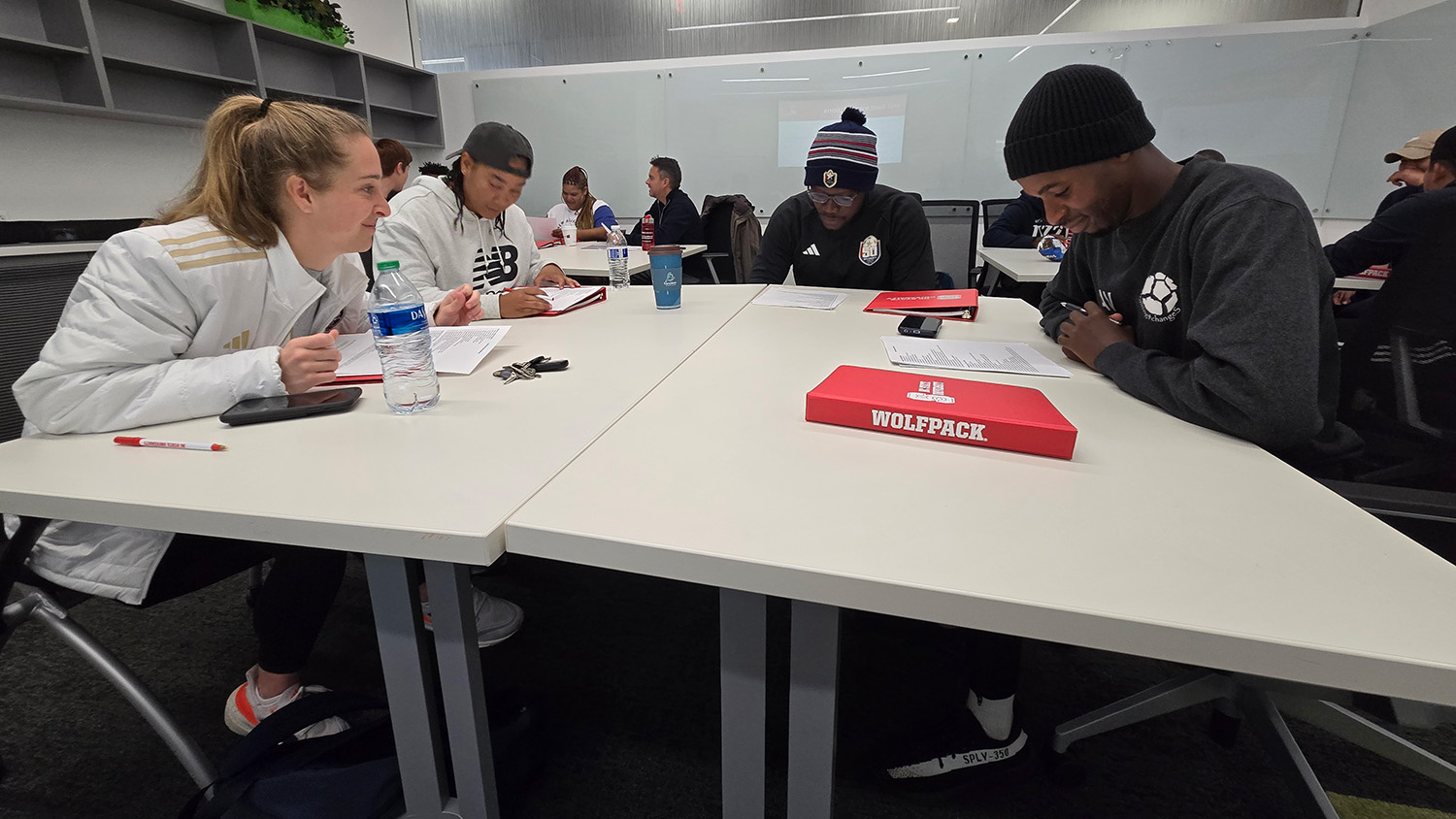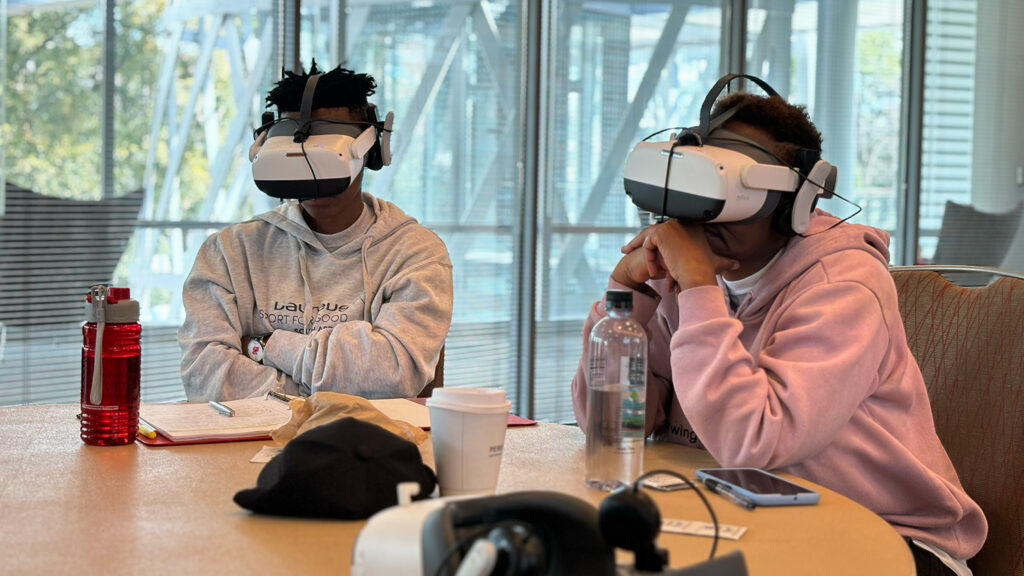Exchange Program Promotes Positive Youth Development Through Sports

Coaches have the potential to positively influence the moral and social development of young athletes. They can not only demonstrate what leadership looks like, but they can also help kids learn to communicate, build relationships and cope with adversity. These are all important aspects of life.
Funded by the Sports Diplomacy Division within the U.S. Department of State’s Bureau of Education and Cultural Affairs, the Empowering New Voices through Education and Sport Training (ENVEST) program aims to improve the capacity of coaches to implement youth soccer programs that increase leadership skill development and promote respect for differences and inclusion among participants.
“Youth sports coaches often focus on the athletic development of their players,” said Mike Edwards, an associate professor in the Department of Parks, Recreation and Tourism Management at NC State. “Our goal is to help these coaches understand that they can accomplish much more than that.”
Edwards is leading the program alongside Jason Bocarro, the Owens-Shelton Distinguished Professor of Leadership with a Global Perspective at NC State. Other collaborators include Debbie Acker and Tiffany McLean of the Shelton Leadership Center, Kim Bush and Erin Adair of the Department of Parks, Recreation and Tourism Management, and Brendan Knott of Cape Peninsula University of Technology in Cape Town, South Africa.
ENVEST brings together 10 coaches from North Carolina Football Club Youth, one of the largest youth soccer organizations in the U.S., and 10 coaches from a variety of South African organizations to participate in a cultural exchange experience focused on leadership development, diversity and inclusion and program implementation.
“This program is designed to facilitate an exchange of knowledge between youth soccer coaches,” Bocarro said. “We selected soccer because we want to benefit as many coaches — and athletes — as possible. Soccer is one of the most accessible sports in terms of participation from all racial and ethnic backgrounds.”
South African coaches visited Raleigh, North Carolina in March for two weeks to participate in a variety of training sessions, workshops and seminars led by Edwards, Bocarro, McLean and Bush at NC State. The coaches also had the opportunity to engage with North Carolina Football Club coaches, the NC State men’s soccer team, visit Carter-Finley Stadium and talk to some of the NC State football coaches.
A two-day workshop, led by McLean and Bocarro, focused on helping the coaches identify their individual talents and strengths; examine how their talents and strengths inform their coaching style; recognize the impact of cultural and contextual factors related to ethical decision-making; and more. It also included a virtual reality experience focused on helping the coaches understand authority, diverse communication styles and the inherent power dynamics of the modern workplace.

During their final days in Raleigh, the South African coaches led coaching sessions at Washington GT Magnet Elementary School, observed North Carolina Football Club coaches and participated in a U.S.-based coach certification course led by North Carolina Youth Soccer Association. They also visited the North Carolina Executive Mansion, WakeMed Soccer Park — home of North Carolina Football Club’s professional teams — and PNC Arena.
North Carolina coaches will visit Cape Town, South Africa for two weeks in July to participate in similar training sessions, workshops and seminars. One of the workshops, facilitated by the Football Foundation of South Africa, will focus on South African experiences of diversity and inclusion within team environments as it relates to race, culture, language, gender and ability.
“The Football Foundation of South Africa does tremendous work in the area of using sport to promote youth development that some of these North Carolina coaches can benefit from,” Bocarro said.
Established by the English Premier League in 2008, the Football Foundation of South Africa aims to uplift communities by empowering individuals through accredited skills training and leadership opportunities and by promoting education, health, social integration and participation through sports.
Bocarro and Edwards visited Cape Town, South Africa in 2015 and 2016 as guest lecturers at the Cape Peninsula University of Technology. During their initial visit, the professors toured the Foundation’s Gansbaai Communal Sport Centre where they got a firsthand account of how sport can be used for youth development.
The Gansbaai Communal Sport Centre operates a soccer training program for hundreds of youth from Masakhane Township, Blompark and Gansbaai. The communities are split along racial lines due to the apartheid-era Group Areas Act, which segregated residential neighborhoods. Masakhane Township is predominantly black, while Blompark is predominantly multiethnic and Gansbaai is predominantly white.
While observing a training session at the Centre, Bocarro and Edwards noticed that each team consisted of a white, black and multiethnic coach. “At first, we thought it was a bit inefficient to have three coaches,” Bocarro said. “But then we realized that it was intentionally structured that way to model how three different races could work together to deliver an excellent program.”
Edwards, who has served as a coach for North Carolina Football Club Youth since 2013, added that the upcoming trip to South Africa will provide the organization’s coaching staff with valuable insights about how to provide equitable programs that break down social barriers and bring youth from all backgrounds together to enjoy the many benefits of sport.

America’s youth sports landscape has become heavily privatized over the past couple of decades, largely due to the emergence of pay-to-play programs that require parents to shell out large amounts of money to transform their children into potential collegiate or professional athletes. This has led to a steep decline in Little League and grassroots programs, meaning there are fewer opportunities for underprivileged youth to participate in sports.
In South Africa, on the other hand, the youth sports landscape is much more accessible to participants from all social and economic backgrounds and is focused on the holistic development of participants — in part because of substantial investments from the government and nongovernmental organizations that have led to the creation of programs like those offered at the Gansbaai Communal Sport Centre.
“Even if the most forward-thinking organization in the U.S. wants to implement sport for youth development, it might struggle to accomplish this because of a resistant coach that feels pressure to produce wins and talent,” Edwards said. “We can learn from our South African partners by hearing about the struggles they’ve dealt with and overcome in their efforts to create lower-cost programs that promote athletic development and the goals we want to promote.”
Edwards added that the ENVEST program has the potential to make a significant impact on coaches working with youth. North Carolina Football Club Youth involves over 800 coaches and more than 13,000 players. It offers TOPSoccer (for athletes with a disability), La Liga (for underrepresented Latinx youth), and DPAL (community outreach program). Meanwhile, the South African coaches engage with thousands of youth from all over the country.
Upon completing the ENVEST program, the participating coaches are expected to leverage their learning to enhance community engagement, leadership and program implementation. “The idea is that the coaches will share their knowledge more broadly,” Bocarro said. “We were very strategic about who we selected in that we selected coaches who can train others within their organizations.”
The coaches will have the opportunity to participate in additional virtual programs to continue their development. Bocarro and Edwards are working with Adair to create a collaborative, online course that utilizes videos and other resources to help coaches around the world.
This post was originally published in College of Natural Resources News.
- Categories: